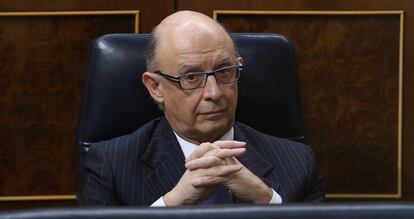Spanish government eyes tax hike on tobacco, alcohol and diesel fuel
Proposals backed by emerging center-right group Ciudadanos to avoid income tax increase
As the government explores its options for raising more revenue next year, which could include raising corporate tax, emerging center-right group Ciudadanos has said it will accept hikes on tobacco and diesel fuel as part of the Popular Party’s (PP) 2017 budget, as long as Prime Minister Mariano Rajoy agrees not to increase sales or income tax.

“We can accept these increases in such a case,” said a member of the economic team of Ciudadanos, which reached agreement with the PP this summer to support its minority government in Congress.
Ciudadanos leader Albert Rivera has also called on the government to raise more revenue by cutting spending on regional administration, an overhaul of company taxes, and clawing money back from people who benefited from the PP’s 2012 tax amnesty which barely raised half of the €2.5 billion in back taxes and instead shed light on at least €25 billion estimated to be hidden away in offshore accounts.
In the run up to the June elections, Rajoy said he wanted to cut corporate tax
Finance Minister Cristóbal Montoro has said he would prefer not to increase sales or income tax, and has already signaled a willingness to put the price of cigarettes up, as well as slapping a duty on sugary drinks. So-called green taxes are another route to raising revenue that would see taxes on the generation of nuclear waste, hydro-electric energy, gas, coal, heating oil and diesel.
Spain must present a package of measures to Brussels by the beginning of December to meet demands to cut €5.5 billion to reduce the country’s structural deficit – debts it believes it can avoid.
The government has indicated that it intends to lower the current 21% sales tax on concerts and theatre shows to 10% – part of the deal struck with Ciudadanos that brought the PP to power – and that it won’t raise sales tax from 10% to 21% in the tourism and hospitality industries.
But even with the support of Ciudadanos in Congress, the PP does not have the votes needed to pass its 2017 budget and will be looking for support from the Basque National Party and the Canaries Coalition. The Socialists (PSOE) have said they will not support Rajoy’s public accounts.
Ciudadanos wants the government to go after the beneficiaries of its 2012 tax amnesty
In an interview with the Financial Times on Sunday, Economy Minister Luis de Guindos said the government was not planning to raise sales or income tax and that corporate tax would make up the bulk of any shortfall in revenue. He said that in 2007, Spain collected some €40 billion in company tax and that this year the figure would be €20 billion. He attributed the drop to the ongoing economic crisis, but added that Spain’s economy was picking up and company profits were returning to similar levels to those of 2007. “What is the difference? Many companies have accumulated a negative tax base and you can deduct that.”
He added that the government would now close some of the “loopholes and deductions” used by companies.
In the run up to the June elections, Rajoy said he wanted to cut corporate tax, depending on the evolution of tax revenues.
Guindos also referred in the interview to the privatization of Bankia, the former Caja Madrid savings bank and financial group bailed out and nationalized in 2012. He said next year’s deadline could be extended, and that a decision depended on market conditions.
English version by Nick Lyne.
Tu suscripción se está usando en otro dispositivo
¿Quieres añadir otro usuario a tu suscripción?
Si continúas leyendo en este dispositivo, no se podrá leer en el otro.
FlechaTu suscripción se está usando en otro dispositivo y solo puedes acceder a EL PAÍS desde un dispositivo a la vez.
Si quieres compartir tu cuenta, cambia tu suscripción a la modalidad Premium, así podrás añadir otro usuario. Cada uno accederá con su propia cuenta de email, lo que os permitirá personalizar vuestra experiencia en EL PAÍS.
¿Tienes una suscripción de empresa? Accede aquí para contratar más cuentas.
En el caso de no saber quién está usando tu cuenta, te recomendamos cambiar tu contraseña aquí.
Si decides continuar compartiendo tu cuenta, este mensaje se mostrará en tu dispositivo y en el de la otra persona que está usando tu cuenta de forma indefinida, afectando a tu experiencia de lectura. Puedes consultar aquí los términos y condiciones de la suscripción digital.








































